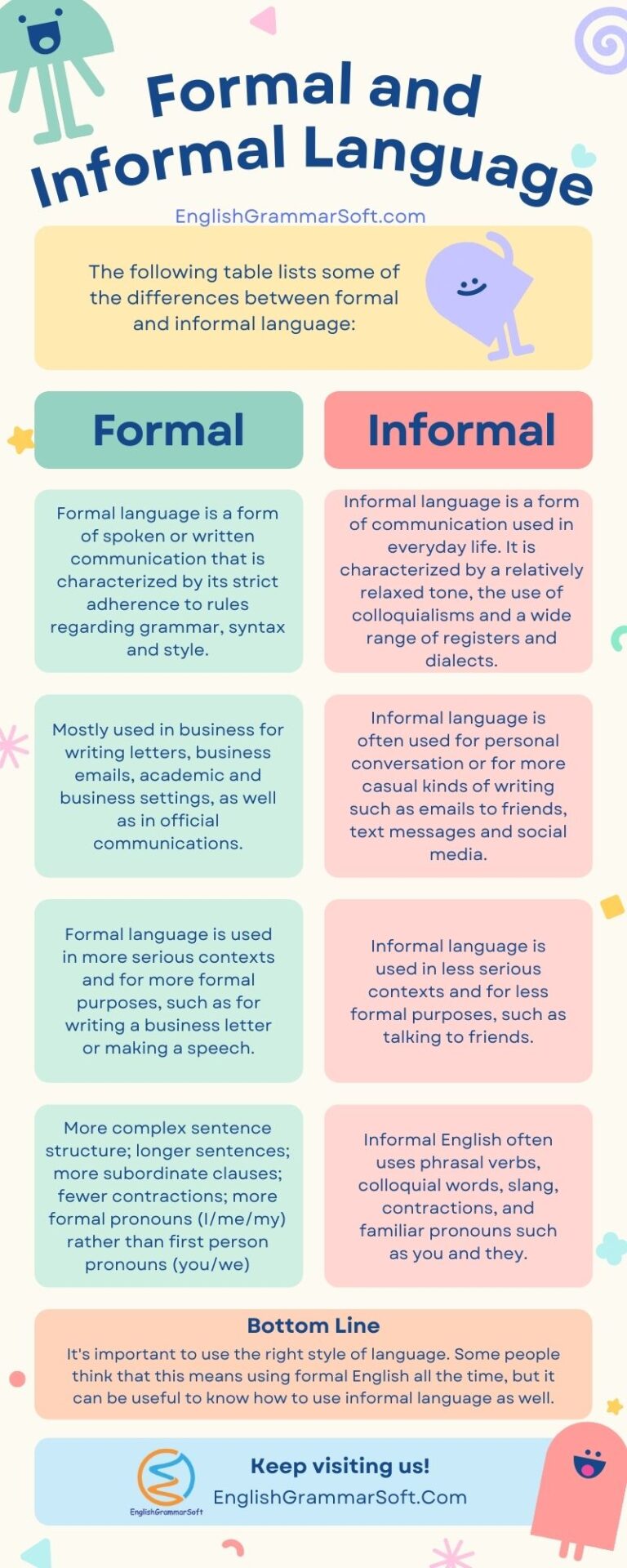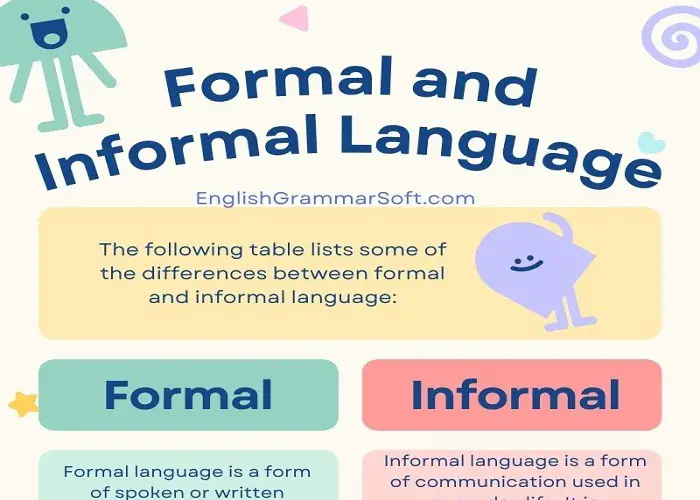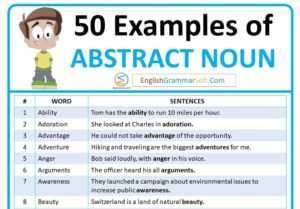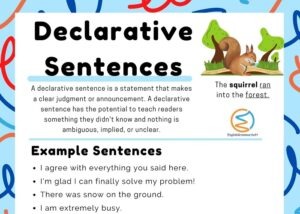Similarities & Differences Between Formal and Informal Language
The difference between informal language and formal language is that the former is spoken and informal, but the latter is written and formal. In this article, we will discuss more about informal language versus formal language.
Formal and Informal Language
Formal English is used mainly in formal writing and speech, such as business and academic English.
It is used in “serious” texts and situations — for example, in official documents, books, news reports, articles, business letters or official speeches.
Formal English is less personal than informal English. It is used when writing for professional or academic purposes like university assignments. It does not use colloquialisms, contractions or first person pronouns such as ‘I’ or ‘We’.
At university, all the important information about your course will be written in formal language — for example: rules about assessment and penalties for late submission of work.
In a professional context it is important to use formal English. For example:
- When you write an email to your manager to ask if you can go home early from work (because of a headache)
- When you write a letter of complaint to a hotel about their poor service during your stay there last week
Informal English is used in everyday conversations and in personal letters
Informal English is used in everyday conversations and in personal letters. This style is a little more personal than formal writing. Informal writing may include slang, figures of speech, broken syntax, asides and so on.
Informal writing takes a personal tone as if you were speaking directly to your audience (the reader). You can use the informal style to write to your friends, family or colleagues. For example, you may use an informal style:
- To chat with your friends on Facebook.
- To write emails or text messages to your friends.
- To write informal business letters.
- To write a personal letter.
Formal English tends to use more noun-based phrases instead of phrasal verbs
In more formal settings, you can expect to see more noun-based phrases than phrasal verbs. Here are some examples of noun-based phrases: “take into consideration,” “pay attention to.”
You may see a sentence such as, “The committee took into consideration all possible options before making their final decision.” A sentence like this uses a noun (consideration) instead of a verb (considered). This makes it feel more formal.
Informal English often uses phrasal verbs, colloquial words, slang, contractions, and familiar pronouns such as ‘you’ and ‘they’.
Informal English often uses phrasal verbs, colloquial words, slang, contractions, and familiar pronouns such as you and they.
Phrasal verbs are usually informal. You may use them in spoken English or dialogue but should not use them in formal writing.
Colloquial words are generally more informal. Slang is even more informal than colloquial words.
Avoid using contractions such as can’t or won’t in your formal writing. However, do not avoid contractions when you are speaking; it sounds unnatural to say cannot or will not out loud.
Formal English prefers to avoid the pronoun you when making a general statement about people in general:
- You should be polite to people who are rude to you. (informal)
- People should be polite to other people who are rude. (formal)
Which style to use depends on the audience.
It’s important to use the right style of language. Some people think that this means using formal English all the time, but it can be useful to know how to use informal language as well.
You should speak or write formally to older people, people in authority, and people you don’t know well. Formal English uses more difficult vocabulary and longer sentences than everyday speech does. For example: “I am writing with respect to your advertisement for a summer work placement program.”
You should speak or write informally to friends and family, or to people you know well. Informal English uses shorter sentences and simpler words than formal English does. For example: “I’m not doing anything tonight. Do you want to come over?”
You should speak or write formally when you are giving a speech or writing an official email message—for example, one that is sent to your boss at work. In these situations, it’s important that you sound professional so that your audience will take you seriously!
Differences Between Formal and Informal Language
The following table lists some of the differences between formal and informal language:
| Formal Language | Informal Language |
|---|---|
| Formal language is a form of spoken or written communication that is characterized by its strict adherence to rules regarding grammar, syntax and style. | Informal language is a form of communication used in everyday life. It is characterized by a relatively relaxed tone, the use of colloquialisms and a wide range of dialects. |
| Mostly used in business for writing letters, business emails, academic and business settings, as well as in official communications. | Informal language is often used for personal conversation or for more casual kinds of writing such as emails to friends, text messages and social media posts. |
| Formal language is used in more serious contexts and for more formal purposes, such as for writing a business letter or making a speech. For example, you would use formal language when writing a business letter to your boss. | Informal language is used in less serious contexts and for less formal purposes. For example, you would use informal language when talking to your friends over the phone. |
| Formal language is typically more elaborate, with complex sentence structures and more words per sentence than ordinary conversation. It’s often used in writing to make ideas more precise, but it can also be useful in spoken communication when you need to sound professional or knowledgeable. | Informal language is common in personal conversations and everyday writing. People use informal language when they want to sound natural or friendly, but it’s not appropriate for most professional settings because it can make you sound unprofessional or uneducated. |
| Formal language is used in business, government and other formal situations. It is not as relaxed or casual as informal language. For example, you would use formal language when writing a letter to the president of your company or to a business contact in another country. | Informal language is used in everyday situations among friends and family members, for example when talking about sports, hobbies or personal interests. It is also used in social media, such as Facebook and Twitter. |
| More complex sentence structure; longer sentences; more subordinate clauses; fewer contractions; more formal pronouns (I/me/my) rather than first person pronouns (you/we) | Informal English often uses phrasal verbs, colloquial words, slang, contractions, and familiar pronouns such as you and they. |
Similarities
There are some similarities between formal and informal language.
- Both formal and informal language refer to the same thing, which is communication between two or more people.
- Both formal and informal language use words and sentences to communicate ideas and thoughts.
- Both formal and informal language have a purpose or function (i.e., to tell/inform someone about something).

Further Reading






